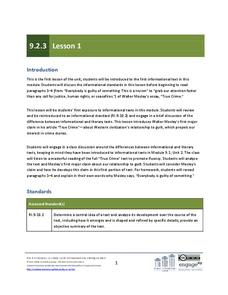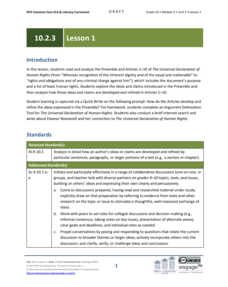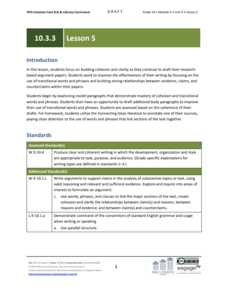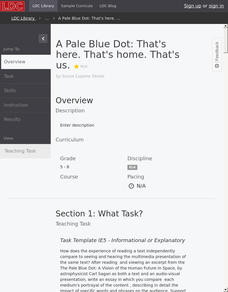Curated OER
Barnyard Protest: Cows, Chickens & Fundamental Freedoms
Here is an ambitious and engaging lesson that should help elementary schoolers begin to develop a basic understanding of human rights. Pupils are asked to think about their own rights, the rights of others, and how an individual's voice...
Scholasic
The Magic School Bus and the Missing Tooth
We chew with our teeth every day, but how much do we really know about them? Allow Ms. Frizzle to teach your kids a thing or two about teeth. Kids complete a prereading exercise, read the book, and respond to several prompts about the...
EngageNY
Grade 10 ELA Module 3: Unit 3, Lesson 1
Human tissue for sale or rent? Scholars refer back to articles they read in the previous unit and make a claim as to whether they believe it's okay to sell human tissue. Learners talk with partners, complete an outline tool, and collect...
EngageNY
Grade 9 ELA Module 1, Unit 1, Lesson 15
How much progress has Claudette made at the end of "St. Lucy's Home for Girls Raised by Wolves"? Ninth graders note evidence for and against Claudette's successful adaptation into human society with a graphic organizer. Additionally,...
EngageNY
Grade 9 ELA Module 1, Unit 1, Lesson 16
Prepare for the end-of-unit assessment in a unit focused on Karen Russell's "St. Lucy's Home for Girls Raised by Wolves." As your class continues gathering evidence to support or argue against the success of Claudette's adaptation into...
EngageNY
Grade 9 ELA Module 3, Unit 1, Lesson 4
Can dogs feel shame? Explore the anthropomorphic connection between human emotions and animal behavior—or lack thereof—with a lesson about Temple Grandin's book, Animals in Translation. Ninth graders continue a close reading of chapter...
EngageNY
Grade 9 ELA Module 2, Unit 3, Lesson 1
"True-crime stories, murder mysteries, up-to-the-minute online news reports, and (as always) rumor and innuendo grab our attention faster than any call for justice, human rights, or ceasefires." Or so says Walter Mosley in his Newsweek...
EngageNY
Grade 9 ELA Module 4, Unit 1, Lesson 16
The Sugar Changed the World chapter, "The Sound of Liberty," highlights how the differing attitudes toward the slave trade shifted the issue from an economic concern to a concern for human rights. The passage contrasts Thomas Jefferson's...
EngageNY
Grade 10 ELA Module 2: Unit 3, Lesson 4
It is, and it is not. Scholars examine how these words impact Eleanor Roosevelt's speech, in which she tries to persuade the adoption of the Universal Declaration of Human Rights. Readers note rhetoric and figurative language. They then...
EngageNY
Grade 10 ELA Module 2: Unit 3, Lesson 1
Scholars examine the Universal Declaration of Human Rights and analyze the ideas in the preamble. Readers define new vocabulary words, listen to a Masterful Reading, answer questions in pairs, participate in a jigsaw discussion, and...
EngageNY
Grade 10 ELA Module 2: Unit 3, Lesson 2
Is good good enough? Scholars examine claims made in a speech by Elanor Roosevelt. Roosevelt claims that people should adopt the Universal Declaration of Human Rights because it is a good document. Readers discuss their ideas in pairs,...
EngageNY
Grade 10 ELA Module 3: Unit 3, Lesson 5
Can you please clarify? Scholars continue to work on their argumentative essays about selling human tissue by clarifying and adding cohesion. Writers begin by looking at model paragraphs and then begin improving their writing. They...
EngageNY
Grade 10 ELA Module 3: Unit 3, Lesson 2
Put yourself in my shoes! Scholars work through the Outline Tool from the previous lesson to develop a claim before developing a counterclaim about selling human tissue. Learners also create supporting claims using an outline tool. For...
EngageNY
Reading for Gist and Answering Text-Dependent Questions: Industrial Food Chain
Where do humans fall on the food chain? Scholars read about the Industrial Food Chain in The Omnivore’s Dilemma sections. They use word catchers to record unfamiliar words as they read and place sticky notes in the margins to annotate...
Creative Learning Exchange
Lesson Plans From The Lorax
When it comes to the environment, no variable is constant. Class members graph behavior over time for the thneeds produced over truffula trees chopped down over the course of Dr. Seuss's The Lorax.
Population Connection
Lessons From the Lorax
Is progress progressing too fast? So believes the Lorax, the eponymous character from Dr. Seuss's The Lorax. Young environmental science students read the book and debate the arguments of the Lorax and the Once-ler regarding the...
Curated OER
Traveling Through the Digestive System
Second graders learn about how the food is broken down in our bodies and the job of each body part involved in our digestive system. The utilize the CD ROM game, "Body Works." This wonderful game takes pupils through the human body's...
Odyssey of the Mind
Odyssey of the Mind Curriculum Activity: Making of a Monster
Over the course of a week, the class will study how monsters are portrayed throughout literature. But why? Monsters in science fiction or horror often depict the darker side of human nature; they are described for their horrific physical...
Teaching English
In Flanders Fields
War is one of the most profound human experiences in history, and is often best depicted in works of art and literature. Introduce class members to the poetry of World War I with this resource that uses John McCrae's "In Flanders Fields"...
Odyssey of the Mind
Odyssey of the Mind Curriculum Activity: GREAT TO COMMUNICATE
Humans love to communicate and they do it in so many different ways. The class investigates how people have used new inventions and technological innovations to communicate. They are divided into groups of three or four and given...
Literacy Design Collaborative
A Pale Blue Dot: That's Here. That's Home. That's Us.
21st-century learners live in such a visual world that many are unused to letting their minds imagine the picture that words create. An excerpt from Carl Sagan's lecture, "The Pale Blue Dot: A Vision of the Human Future in Space,"...
Curated OER
Abstract to Real: The Human Form in Art
Students analyze and evaluate the effects of abstraction and realism on depictions of the human form in ancient and modern-day cultures.
Curated OER
Cave Art: Discovering Prehistoric Humans through Pictures
Students explore how people in earlier times used art as a way to record stories and communicate ideas. By studying paintings from the Cave of Lascaux and other caves in France, students discover that pictures are more than pretty colors.
Curated OER
Around Derby Museum and Art Gallery
In this Derby Art Gallery worksheet, learners complete 15 fill in the blank questions regarding the paintings and information at Derby Museum and Art Gallery. Answers are provided.























